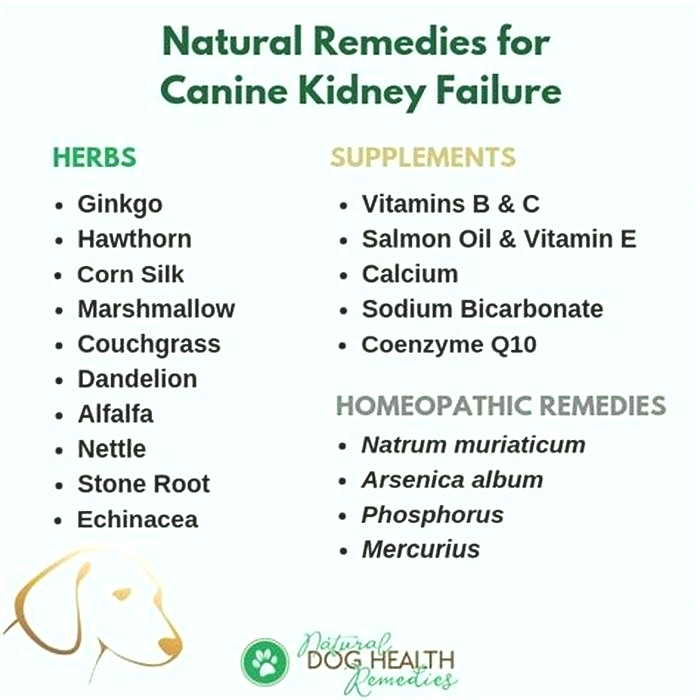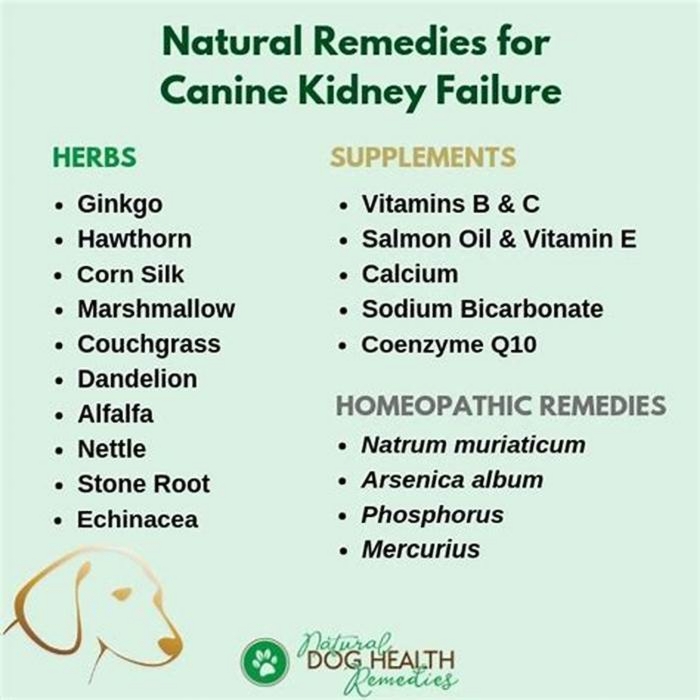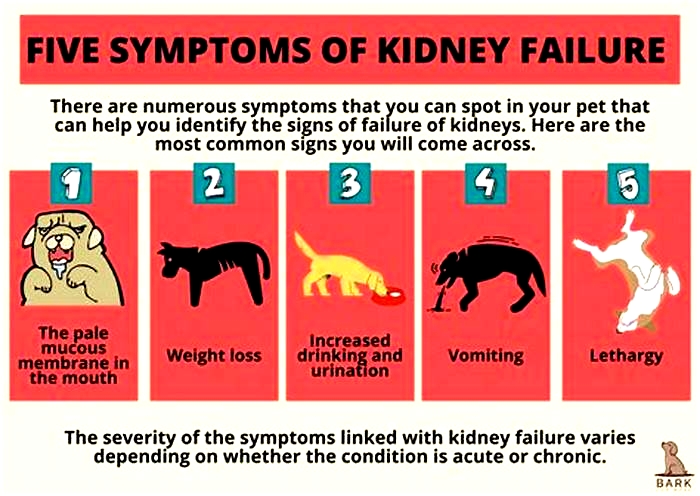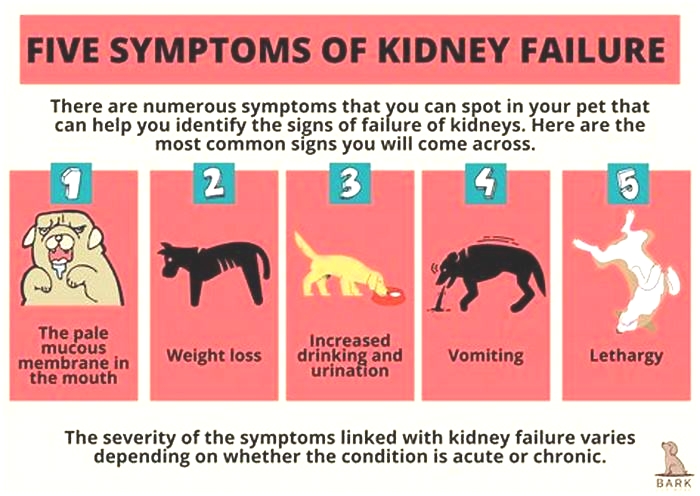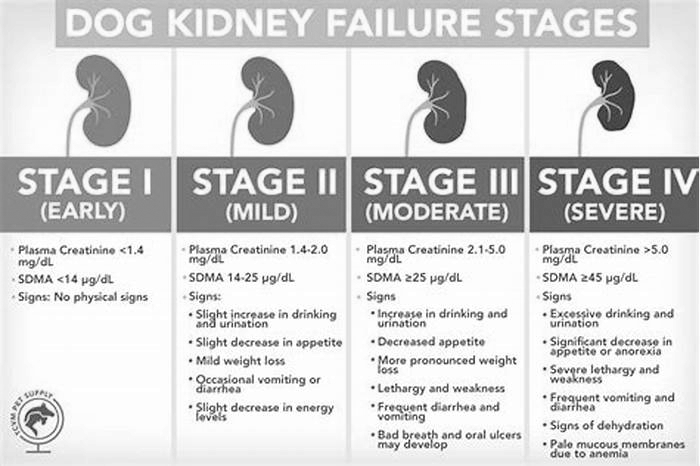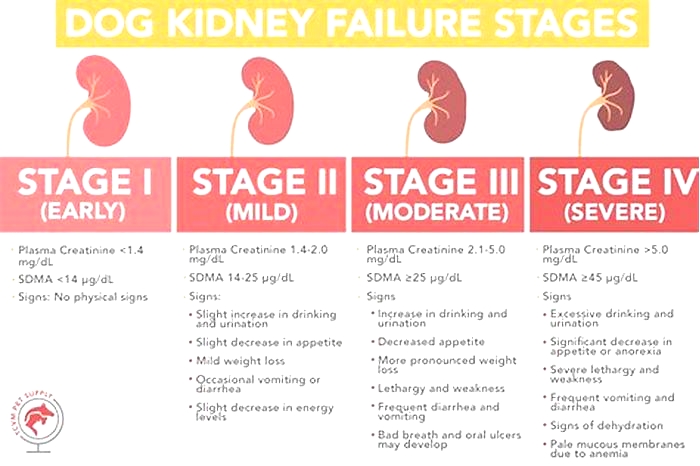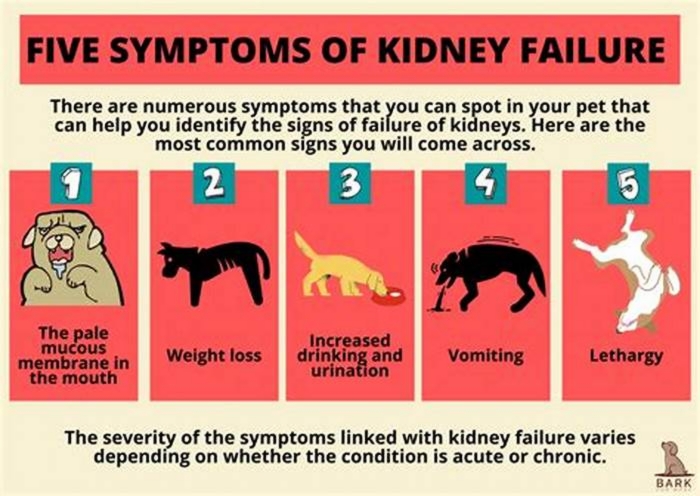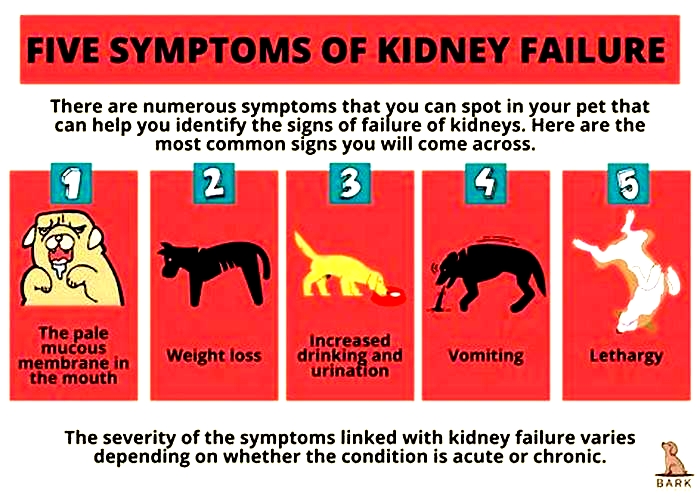kidney failure dogs cure
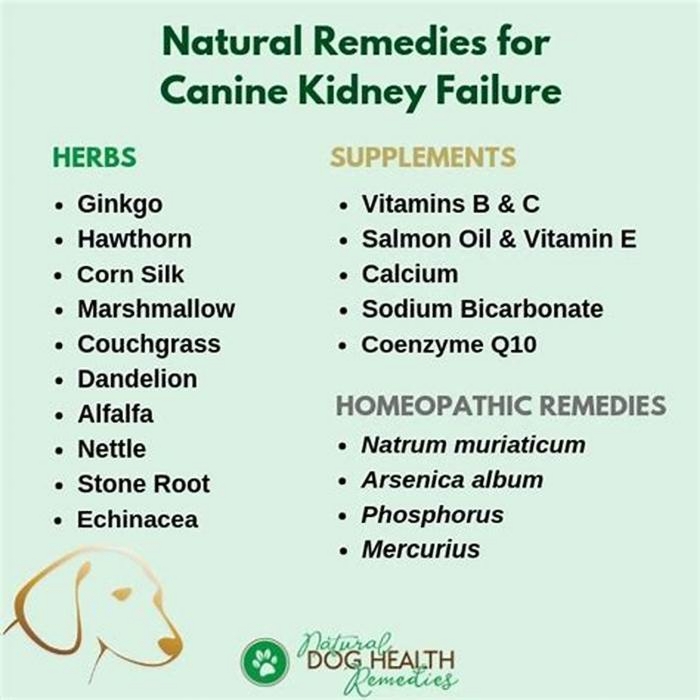
Kidney Failure in Dogs: Causes, Symptoms & Treatment
In this post, well dive into the causes of kidney failure in dogs, common symptoms you should look out for, available treatment options, and more.
Table of Contents
Pro Tip: Not all pet insurance will cover your vet bills if your dog develops a long-term illness. Thats why its very important to have the right pet insurance plan in place.
Types of kidney failure in dogs
Just like in humans, healthy kidneys in dogs control blood pressure, regulate hydration, remove toxins, release hormones needed to produce red blood cells, and maintain a normal electrolyte balance. If the kidney function is impaired, kidney failure occurs. When the kidneys dont work properly, a number of other organs can be affected, including the brain and heart.
Kidney failure (also called renal failure) in dogs can be chronic or acute:
Chronic kidney failure
This occurs when the kidneys lose function gradually and is typically caused by degeneration related to old age. Chronic kidney failure is the most common type of kidney disease in dogs, occurring in 0.5% to 1% of dogs.
Acute kidney failure
This occurs when a canine's kidney function suddenly decreases, usually within hours or a few days. Its typically caused by a severe kidney infection or the consumption of toxins.
The main difference between these two types of kidney failure is that acute kidney failure can be reversed with timely and aggressive treatment. Chronic kidney failure, on the other hand, cant be reversed or cured and it can only be managed. In most cases, the damage to the kidneys has been happening for more than three months and the kidneys will continue to worsen.
What causes kidney failure in dogs?
Chronic kidney failure in dogs
The exact cause of chronic kidney failure is often difficult to pinpoint because of its slow onset. Early symptoms are usually mild and can be easily overlooked or dismissed.
Dental disease is a leading cause of chronic renal failure in senior dogs. Bacteria build up in the animals teeth and enter the digestive system through eating and drinking, affecting the kidneys ability to filter waste over time.
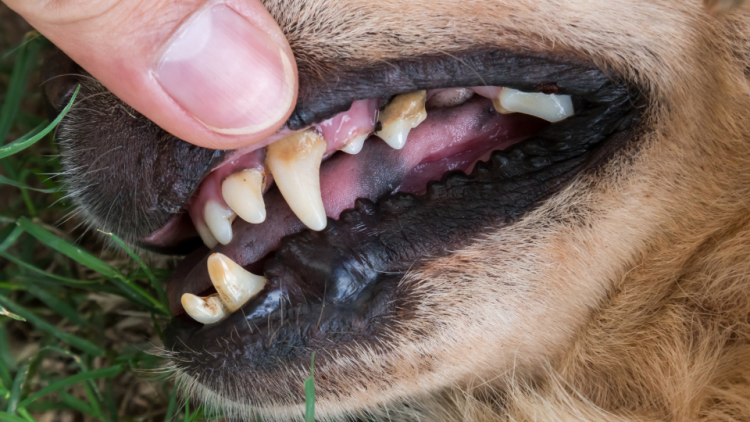
Chronic kidney failure can also be caused by:
- Congenital diseases or birth defects (such as agenesis, when the dog is born missing one or both kidneys)
- Kidney cancer (renal neoplasia)
- Polycystic kidney disease
- Kidney infections
- Fanconi syndrome
- Elevated calcium (hypercalcemia)
- Kidney stones
- Renal dysplasia
- Immune system dysfunction
- Poor blood flow to the kidneys
- Blocked urine movement or flow
- Certain medications (such as NSAIDs and some antibiotics)
Acute renal failure can also lead to chronic renal failure.
Acute kidney failure in dogs
Acute renal failure is most often a result of a dog ingesting poison. It might be antifreeze, household cleaners, or certain drugs. Some human foods like grapes and raisins have also been known to cause kidney failure if eaten frequently and in larger quantities.
Severe bacterial infections can also cause acute kidney failure. Even though kidney infections can occur spontaneously, theres usually a reason why the dog has trouble fighting off the infection, such as urine blockage or kidney stones.
Leptospirosis is one example of a bacterial infection that can cause sudden renal failure in pups. Our canine companions can get leptospirosis by coming into contact with infected urine, water, soil, water, food or bedding, or through a bite from an infected animal. Be sure to talk to your vet about vaccinating against this disease.
Kidney issues can also result from decreased blood flow through the kidneys. This can be caused by severe dehydration (usually from severe diarrhea or vomiting), heatstroke, or snake bites, and bee stings.
Signs of kidney failure in dogs
The most common symptoms in dogs with kidney failure include:
- Excessive thirst and urination
- Lethargy
- Decreased appetite
- Weight loss
- Bad breath
- Pale gums
- Vomiting
- Blood in urine
- Ulcers in the mouth
- Uncoordinated movement such as stumbling
- Intestinal seizures
Dogs with chronic renal failure might not show any clinical signs at first, or the signs might be very subtle.
In severe renal failure, the amount of urine might actually decrease, or the dog might stop making urine altogether. As the condition worsens, other symptoms may include blood in the stool, black or tarry stool, or vomiting blood.
Diagnosing kidney failure in dogs
Blood and urine tests are commonly performed to diagnose kidney failure. Other tests, such as ultrasound, X-rays, and special blood tests might be needed in order to assess the severity of the disease and determine the cause for the failure. In some cases, a biopsy of the kidney might be recommended.
How to treat kidney failure in dogs
Treatment for kidney failure in dogs will depend on the severity of the condition and the underlying reason that caused their kidney to fail.
Dogs with acute renal failure can get very ill and might need to be hospitalized. Milder cases can be treated with antibiotics and fluids on an outpatient basis.
In some cases, dialysis might be necessary. Signs that indicate dialysis should be considered include very high potassium levels, lack of improvement in lab results while the pet receives intravenous fluids, and fluid in the lungs. Both hemodialysis and peritoneal dialysis can be effective but are generally quite expensive.
While damage from acute renal failure is more easily treated, chronic renal failure will cause irreversible damage to your dogs kidneys unless caught early. For that reason, veterinarians generally focus on slowing down the progression of the disease and finding ways to improve the dogs quality of life, usually with medication and diet changes.
Your pups treatment plan might also include:
- Electrolytes to balance out blood levels
- Medications that encourage the production of urine
- Medications to ease gastrointestinal problems
- Medications to reduce vomiting
- Medications for anemia
- Blood pressure management
If kidney disease is left untreated, end-stage renal failure might occur, leading to death. If you suspect your pet has kidney failure, contact your veterinarian or take your dog to an emergency clinic for a diagnosis and treatment.
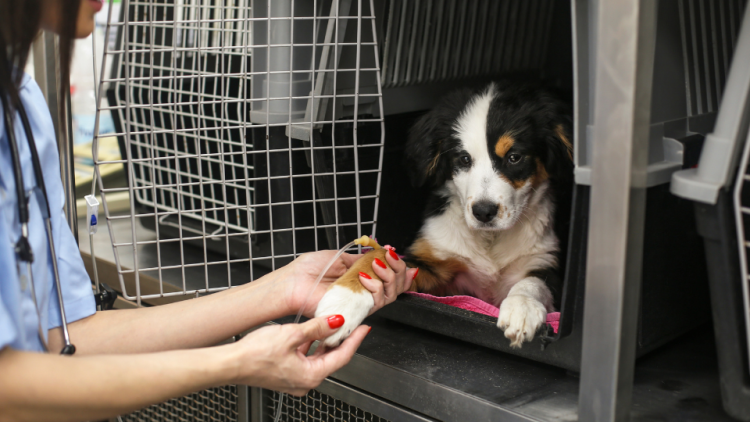
Cost to treat dogs kidney failure
The cost of diagnosis and treatment will also depend on the cause, as well as on how the dog responds. Initial diagnostic tests usually range between $200 and $750, whereas long-term management of chronic kidney failure can cost between $100 and $500 per month, depending on the prescribed medications and how often IV fluid therapy is required.
Pro Tip: Every dog owner should consider pet insurance. Even if you believe you have enough money to cover veterinary costs, pet insurance could still save you thousands of dollars if your dog gets sick or injured.
Whats the prognosis?
Kidney failure is a very serious disease and about 60% of pets suffering from it will either die or be euthanized because of it. In cases when medical treatment has failed, the chance of survival without dialysis is extremely low. About half of the patients that receive dialysis will recover, depending on what caused the failure. Many of them will recover only partially and end up with permanent kidney damage.
However, some pups manage to recover completely and have a good quality of life for years after being diagnosed with the disease.
Talk to your vet about what you should expect after your dog has been diagnosed and treated for kidney failure. The vet might recommend nutritional supplements and/or a therapeutic diet to manage your pups condition.
Preventing kidney failure in dogs
Considering the fact that acute renal failure is usually caused by ingesting toxins or foods like raisins, preventing it is fairly easy. Make sure to get any poisons, medications, and dog-unsafe foods out of your pups reach. You can also get your dog vaccinated for Leptospirosis.
Chronic renal failure is usually age-related and genetically predetermined, so theres not much you can do to prevent it. However, taking your pet for annual wellness checkups and physical exams can increase the chances of catching the disease early and start treatment before it progresses and becomes more serious.
Managing Kidney Failure in Dogs
Kidney failure in dogs can seem like a devastating diagnosis. If you've been told by your veterinarian that your dog has a kidney problem that might end in kidney failure one day, don't lose hope. Depending on the circumstances, that day may be farther off than you think. With that note in mind, here are a few things you should know.
Identifying Kidney Failure in Dogs
Kidney failure (also known as renal failure) is the end result of any one of a large number of diseases that can affect the kidneys and related organs. Technically, it occurs when the kidneys can no longer efficiently perform their function, which is to filter out toxins, maintain a normal electrolyte balance, regulate hydration, and secrete hormones needed for the production of red blood cells.
There are two broad types of kidney failure in dogs:
- Acute renal failure: When kidney function suddenly declines (in hours or days), the process is referred to as acute. Acute renal failure in dogs is most commonly associated with infections and toxins.
- Chronic renal failure: When the loss of function is more gradual (over weeks, months or years), it's called chronic renal failure. The most common cause of chronic renal failure in dogs is degeneration associated with geriatric decline. All kidneys have their own natural lifespan, but some dogs' kidneys deteriorate more quickly than others.
One of the most notable differences between acute and chronic kidney failure is that acute kidney failure is reversible if treated early and aggressively, whereas chronic kidney failure can only be managed.

The Causes of Kidney Failure
Kidney failure is ultimately caused by any disease affecting the kidneys. These include:
- Bacterial infections, like leptospirosis, which the Centers for Disease Control and Prevention reports can be transmitted by drinking or swimming in contaminated water. This infection can lead to inflammation of the kidneys and consequent destruction of renal cells.
- Toxicosis, or kidney poisoning, leads to damage of the kidneys' cells. It occurs when your dog ingests drugs (like ibuprofen) or poisons (like antifreeze or grapes). The ASPCA's Animal Poison Control Center lists these and other common household items that should be kept out of your dog's reach.
- Congenital disease: Inherited conditions can lead to abnormal kidney function. The Merck Veterinary Manual includes a list of these congenital diseases, from cysts to agenesis (being born without one or both kidneys).
- Geriatric degeneration: When kidneys get old, their cells can decline and die. This is, by far, the most common cause of kidney disease in dogs.
Symptoms of Kidney Failure
The most common signs of kidney failure in dogs include:
- Vomiting
- Increased drinking and urination
- Lethargy
- Weight loss
- Pale mucous membranes in the mouth and elsewhere
The severity of clinical signs associated with kidney disease can vary depending on the presentation (acute or chronic), the extent to which the loss of kidney function has progressed and the underlying cause. Your vet can determine whether these signs point to a kidney problem or another issue, like diabetes mellitus.
Treating Kidney Failure in Dogs
The treatment of kidney failure varies depending on the underlying cause and the canine patient's overall condition. Dogs that are severely ill from acute kidney failure may need hospitalization and intensive care to recover. For milder cases, antibiotics, fluids, and other medications given on an outpatient basis can prove effective. Dialysis is even a possibility for a lucky few whose pet parents can afford the high cost of treatment.
In the case of chronic renal failure in dogs, treatment generally focuses on slowing the progression of disease and improving quality of life for the patient. Treatment of anemia, blood pressure alterations, electrolyte disturbances, fluid imbalances, nausea, and appetite changes is typically necessary. Most of these signs are managed through diet changes and medication. Pets can sometimes experience a good quality of life for years after a kidney failure diagnosis.

Preventing Renal Failure
Given that chronic renal failure in dogs is most commonly the result of genetically predetermined, age-related degeneration, it's not considered preventable. Nonetheless, regular physical examinations and wellness screenings can increase your dog's chances of early diagnosis and treatment.
Acute renal failure, however, is considered preventable in many instances. Vaccination against infectious diseases, like leptospirosis, for example, can prove highly effective. Clearing households of toxins, like antifreeze; being careful with grapes and raisins; and keeping all human medications out of the reach of dogs is also important.
Understanding Your Dog's Risk
The timing of kidney degeneration is likely linked to a dog's genetics. Consequently, chronic renal failure in dogs is effectively preprogrammed to occur at a certain age. Nonetheless, no specific breed predisposition is known to exist. Certain kidney diseases that can lead to renal failure in dogs, however, can disproportionately affect specific breeds. These include the following:
- Basenji dogs are especially affected by Fanconi syndrome, which disrupts electrolyte absorption.
- Bernese mountain dogs can suffer a congenital disease of the kidneys called glomerulonephritis.
- Collies, Shetland sheepdogs and German shepherds can be affected by lupus, an autoimmune disease affecting the kidneys and other organs.
- Shar-Peis can suffer a kidney disease known as familial renal amyloidosis.
It can prove difficult to determine which dogs will suffer these conditions in advance. New blood tests, however, are now helping identify kidney disease in dogs and cats early, sometimes even many years before signs become evident. One test called the SDMA (which IDEXX notes is named for symmetric dimethylarginine, a genetic marker for kidney function) is now considered very common. Many veterinarians consider it part of their annual wellness screening; be sure to ask your vet if this test is available for your dog at your next appointment.
The Role of Nutrition
Nutrition has long been a mainstay in the management of renal failure in dogs. Since maintaining electrolyte balance and managing blood proteins are a crucial part of the kidneys' role, altering the nutrients in a dog's diet can make kidney function easier. All dog parents whose pets suffer from kidney disease should talk to their veterinarian about the ideal therapeutic diet and any additional nutritional supplements that might be in order.
Dog parents have so many more options than ever before when it comes to treating and managing renal failure. Given advances in nutrition and drugs, the longevity of veterinary renal patients is most definitely on the rise. With your veterinarian's assistance, a long life for your pup is a possibility.
Contributor Bio

Dr. Patty Khuly
Dr. Patty Khuly is an honors graduate of both Wellesley College and the University of Pennsylvania School of Veterinary Medicine. She received her MBA at The Wharton School of Business as part of the prestigious VMD/MBA dual-degree program. She's now the proud owner of Sunset Animal Clinic in Miami, Florida. But that's not all. Dr. K is a nerdy reader, avid knitter, hot yoga fanatic, music geek, struggling runner, and indefatigable foodie. She lives in South Miami with three dogs, countless cats, two rescued goats and a hilarious flock of hens.
You can follow her writing at DrPattyKhuly.com and at SunsetVets.com.

